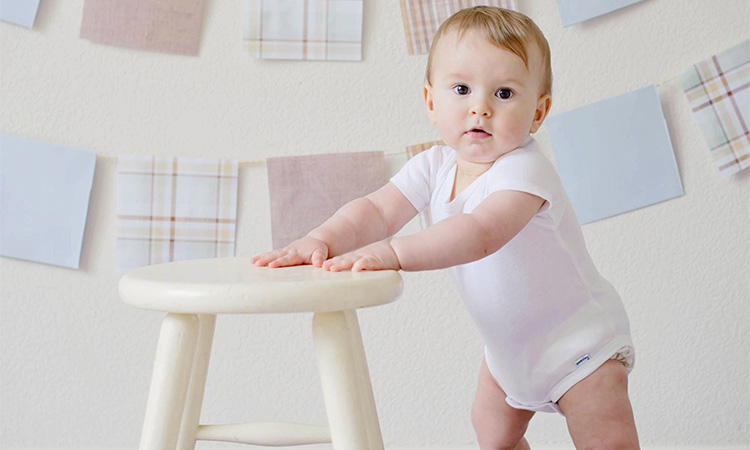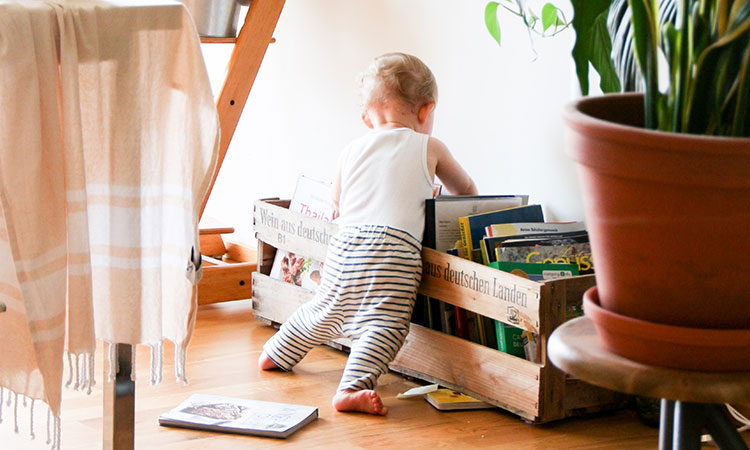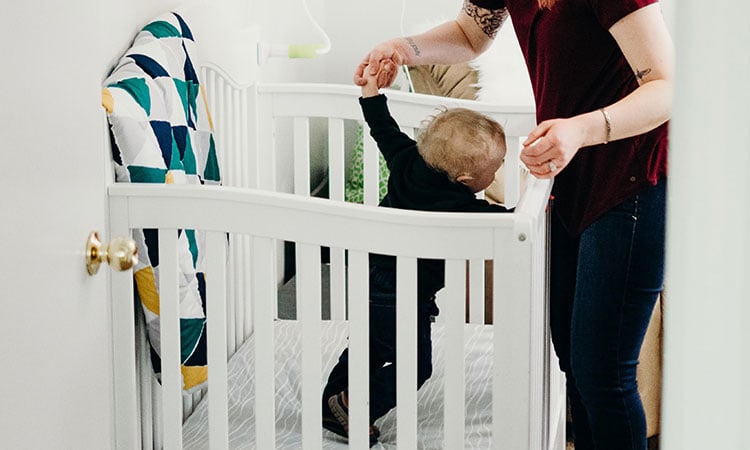Having a baby is being bewildered, surprised and amazed every few days. At first it is those smiles and giggles, and then it is all about sitting and crawling. Watching your baby walk for the first time is every parent’s dream. And parents are always looking for signs that the baby will walk soon.
Once the baby starts crawling, anticipation starts to build in. Seeing those little legs crawling all those days and all of a sudden seeing them start walking is an emotional moment waiting to be captured.
While you may want to keep your cameras ready, the fact is that the transition from crawling to walking takes a few months and requires a lot of patience. And every baby walks at their time – some babies walk as soon as 8 ½ months and some may be well close to their second birthday when they decide to take their first step.

Having said that, if you are wondering if when your baby walks is co-related to how your baby’s intelligence in future, then be assured that there is no connection. A study found that ‘Children who start walking early turn out later to be neither more intelligent nor more well-coordinated.’
When Do Babies Start To Walk
Most babies take 14 months to start walking. Other babies may be faster in pace and start walking from 8 and a half or 9 months itself, while some babies don’t walk until 18 months and even later.
There isn’t any definite timeline that guarantees by what age your baby can start walking, 12 months is an agreed average age for babies to start walking. By the age of 1, walking related physical developments that take place are –
- Pushing up
- Rolling
- Sitting straight upright
- Crawling
- Pulling up to stand
- Stand holding on to furniture
- Try walking holding onto furniture
These stages preceding the milestone of walking are also some common signs your baby will walk soon.
8 Signs Your Baby Will Be Walking Soon
Initially, babies aren’t able to walk because they are unable to carry the weight of their body. However, as their grow older, their leg muscles develop, which help them to start walking. Here are 8 signs baby will walk soon.
1. Sitting up without help
Sitting up is considered as a big milestone for a baby as it helps the baby in walking. If your baby has started sitting up on its own, it means that your baby is learning balance and is strengthening her muscles. Both of these are crucial for walking.
Babies usually start sitting up between 4-9 months,
2. Pulling up

When you see your baby pulling up on furniture or even holding onto your leg to stand, it’s a sign that your baby is ready to take the next step. They will soon start grabbing anything they see in front of them. Pulling up helps to strengthen the leg muscle of your baby and makes leg coordination easier.
Until they have the strength to pull up on their own, they will seek support, indicating that they know what is that they want.
The ideal age of pulling up is 8-11 months.
Encourage your child to pull up and squat back by cheering him on!
3. Crawling and climbing stairs with hands
Crawling is actually a sign that your baby will walk soon. Once your baby starts crawling, it means that they want to freely move around on their own. Crawling acts as a great way in strengthening their hand and leg muscles and improve their motor skills.
And not that they can crawl, they want to explore every nook and corner of the house. Make sure you have taken baby proofing measures so that the explorations turn out safe. Also, your antennas – always on!
The age of crawling usually ranges from 6-13 months.
4. Cruising around the house

Cruising around refers to when your baby tries to walk while holding objects around them, even though they may nose-dive every now and then.
Your baby might first grab onto the coffee table, then sofa and then onto another table while walking around the house. This shows that your baby is learning to shift his balance from one leg to the other while attempting to walk.
This is also the time when you need to be ready for any accidents and be watchful. Give your baby a safe environment to try to walk. Notice the shine and pride in your child’s eyes everytime she can balance herself standing!
5. Holding your hand
If your baby is still in the crawling stage, the baby will hold your hand and take your support to start walking. This is a sign that your baby has made up his mind to learn how to walk and needs your support to do it. Assisted walking is a common way of learning to walk because babies confide in their parents the most.
The expected age for assisted walking ranges between 8 and 14 months.
At this stage you may offer your child pull along toys or musical walking toys to encourage walking. Steer clear of infant walkers though.
6. Fussier than usual
Learning to walk requires patience from both the parents’ and the baby’s end. You will notice your baby getting fussier and more tired than usual. This is because learning to walk takes time and your baby is getting impatient about it. It is hard work indeed, with the little brain and body working overtime.
Your child could be fussier, less tolerant and very irritable. But know that developmental milestones are tough, so remember who the tot is.
Crying, whining and being irritated while making repeated attempts to stand or take baby steps is one of the underlying signs your baby will walk soon.
7. Change in sleep patterns
If you notice that your baby is more tired and sleepier than usual, you need not worry. Your baby spends most of its day crawling around or cruising around furniture. This is a tiresome process which includes a lot of physical activity. Imagine the number of squats your baby is doing everyday!
In such a case, longer sleep cycles are normal as the baby needs more rest to regain energy for the next day. An extra nap or so should not be a botheration.
8. Standing and balancing on one foot

When your baby learns to stand, their steps may be a bit wobbly because they are still learning to balance themselves. Once they’ve mastered how to stand on their own, it’s only a matter of time before they begin to walk. You will soon see your baby walking around and following you everywhere.
Gradually, your little one will try to balance on one foot. And no matter how many times they will fall down, they will try it again. Basically, babies who will walk soon start to learn to shift their weight from one side to another and vice versa.
Babies learn to stand on their own between 8 and 14 months.
How Can I Help My Baby Learn To Walk
If your baby is showing signs of walking readiness, you as a parent could help your baby learn how to walk faster. There are a few exercises that can help.
The first exercise is using a stool to help your baby sit up. If your baby has passed the stage where he/she can sit up without support, this exercise is ideal. Make your baby sit on a small baby stool in a position where your baby’s feet can touch the ground. Now place a toy on the floor and ask your baby to lift up the toy. Once your baby picks the toy up, ask him/her to go back and sit on the stool. Repeat this process for 3-4 times. This will help in strengthening your baby’s leg and shoulder muscles.
Another helpful exercise is cruising and kicking. When your baby is cruising, place a ball on the floor. Your baby may ignore the ball at first. However, if the ball continuously blocks its way, it will eventually kick the ball. This will help the baby practice kicking.
These exercises will give definite results and you will see soon see the signs that your baby will walk soon. Apart from the above exercises you can also hold your baby’s hand to help them walk. Praising them on achieving small milestones towards walking also motivates them to take the next step.
When Should I Worry About My Baby Not Walking
It is important to monitor your baby’s stages of development. If by 14 months your baby is sitting up, pulling up and crawling on its own, it means that your baby’s motor skills are developing.
However, if by the age of 20 months, your baby has not started walking, it is time to consult a paediatrician.
Babies that are born prematurely take longer than normal babies to walk your baby is premature, don’t panic yet. In case of premature babies, if your baby is around 12 months and was born two months prior, consider their adjusted age as 10 months and monitor their progress accordingly.
In other cases, check whether your toddler makes use of both sides of the body, like lifting things with both hands, kicking with both feet, etc. as these actions help in balancing the weight to both sides of the body. If you find something wrong in your baby’s pattern of walking, consult a physiotherapist.
What are the reasons for delayed walking in my baby?
One of the reasons for delayed walking in infants is the late development of motor skills. This means that your baby’s muscles may not have developed enough to cause movement. This could be the cause of abnormalities in the muscle tone or body structure.
Another reason could be the temperament of the baby. Your baby may be content with just laying on its back and enjoying the comfort of the cradle. The idea of crawling or walking may not have occurred to your baby yet.
The health of your baby could be another reason. If your baby has recently been sick or hospitalized, your baby may be too weak to attempt walking. Once your baby regains strength, it will soon begin to walk.
As a parent, seeing your baby unable to walk for a long period can be difficult. However, with patience and courage you can help and motivate your baby to walk. You need to always keep track of your baby’s progress and look out for the signs your baby will walk soon.
It is also important to make sure that you don’t compare your baby’s progress with other babies of the same age. All babies have their own timelines of progress and slowly and steadily, they too will pick up pace and start walking.
